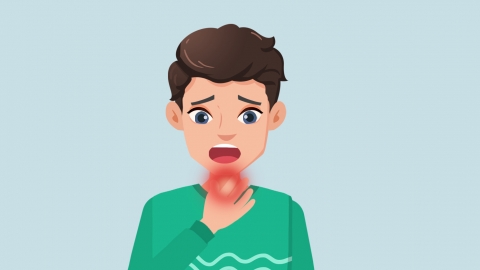What are the most effective medications for treating a sore throat?
Generally speaking, there is no single most effective medication for sore throat. The throat refers to the pharynx, and pharyngeal pain may be caused by factors such as dry environment, dietary irritation, acute pharyngitis, acute tonsillitis, or acute epiglottitis. It is recommended to seek timely medical advice and follow the doctor's instructions for using medications such as Cefalexin Granules, Amoxicillin Capsules, Qinghou Lixiang Granules, Compound Cajuput Granules, and Lanqin Oral Liquid for the treatment of sore throat. Detailed analysis is as follows:

1. Dry Environment
When the air humidity in the surrounding environment is low, moisture from the mucous membranes in the throat area evaporates rapidly, causing the mucous membranes to become dry and fragile, making them prone to inflammation and nerve ending irritation, thus causing throat pain. Medication is generally not required for treatment. Using a humidifier to increase indoor air humidity is recommended, especially important during dry seasons or when staying for long periods in air-conditioned or heated environments.
2. Dietary Irritation
Consuming excessive amounts of spicy, hot, sour, or otherwise irritating foods can directly damage the throat mucosa due to their ingredients, causing inflammation and nerve ending irritation, resulting in throat pain. Medication is generally not required for treatment. It is advisable to maintain a balanced diet, reduce consumption of such irritating foods, and increase intake of vegetables, fruits, and other foods rich in vitamins, which helps maintain the health of the throat mucosa.
3. Acute Pharyngitis
Acute pharyngitis is mainly caused by viral or bacterial infections but can also be triggered by excessive voice use or adverse environmental factors. After infecting the throat, viruses or bacteria multiply extensively on the throat mucosa, triggering an inflammatory response, leading to mucosal congestion and swelling, which stimulates nerve endings and causes pain. It may also be accompanied by symptoms such as fever and fatigue. Treatment can involve using medications such as Cefalexin Granules, Amoxicillin Capsules, and Roxithromycin Dispersible Tablets under the guidance of a physician.
4. Acute Tonsillitis
Acute tonsillitis primarily results from bacterial infection, such as group B hemolytic streptococcus. When the body's resistance decreases, bacteria multiply rapidly and invade the tonsillar crypts, causing inflammation, which may lead to throat pain and could also be accompanied by symptoms like difficulty swallowing and chills. Treatment can involve using medications such as Qinghou Lixiang Granules, Compound Cajuput Granules, and Liushen Pills according to medical advice.
5. Acute Epiglottitis
Acute epiglottitis is mostly caused by bacterial or viral infection and can also result from trauma, allergies, or other factors. The epiglottis is located in the upper part of the throat. When the epiglottis becomes inflamed, it swells. During swallowing, saliva passes through the swollen area of the epiglottis, stimulating nerve endings and causing pain. It may also be accompanied by symptoms such as difficulty swallowing and hoarseness. Treatment requires using medications such as Amoxicillin Clavulanate Potassium Granules, Cefixime Granules, and Lanqin Oral Liquid as directed by a physician.
Maintaining good oral hygiene is important in daily life; brush teeth correctly in the morning and evening, rinse mouth promptly after meals to prevent bacterial growth; develop good living habits, maintain regular作息 (作息 means作息 in Chinese, which refers to work and rest schedule), avoid staying up late, ensure adequate sleep, and maintain the body's normal physiological functions.





